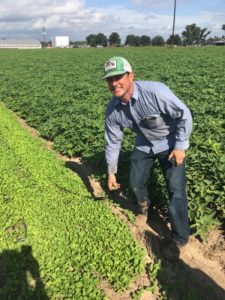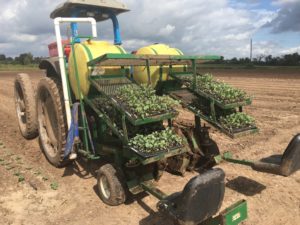
Brenton Johnson owner and founder of Johnson’s Back Yard Garden (JBG), in Austin, Texas, shows the diversity of produce their operation grows 365 days of the year.
By Lindsey Abentroth, Public Affairs and Marketing Coordinator, North Dakota Farm Service Agency
Settled right outside the Austin, Texas city limits lies a small-scale farmland oasis called Johnson’s Backyard Garden (JBG). As the name indicates, JBG began as a small backyard garden in the heart of Austin and has since grown to a 2,000-member community supported agriculture (CSA) operation.
JBG started selling produce at local farmers markets in downtown Austin and experienced so much success, they outgrew the demand for their fresh and local, urban grown products and decided to expand.
In order to meet the increasing requests of providing high-quality organic produce to the Austin community, they currently operate nearly 200 acres of land and employ 100 people, selling fresh and direct, primarily through farmers markets, CSAs and a few local wholesale markets.
“You can’t just plant a row of tomato plants and walk away from them,” Brenton Johnson, owner and founder of JBG, said. “Hard work and dedication 365 days out of the year go into making sure we have a safe and wholesome food source for our customers.”
In recent years, growing food in urban areas has become a trend and continues to expand. Small-scale niche agricultural startups like JBG continue to see an uptick in popularity from people who want their food directly from the farm.
As popular as these urban operations are becoming, the reality is that niche and small scale agriculture operations cannot provide food sources for the world and its growing population.

Preparing to plant turnips at Johnson’s Back Yard Garden (JBG). One individual drives the tractor while two people sit on the seats and hand plant while the tractor drives slowly down the rows.
“JBG is a great example of a family that is willing to work hard to provide our small communities with fresh organic produce,” Tommy Miertschin, Travis County Farm Service Agency (FSA) County Executive Director (CED) said. “They are dedicated, motivated and excited about their business and the opportunity to serve the Austin area with their locally grown products. They are very sophisticated when it comes to marketing their niche produce and are constantly thinking of creative ways to expand their business.”
While FSA continues to help traditional farmers and ranchers, programs are also available for operations like JBG that operate on a smaller scale and specialize in niche markets.
Bordering JBG and also settled right outside the Austin City limits are traditional farm operations that produce food sources on a larger scale.
FSA realizes now more than ever, there are diverse needs, different markets and changing interests that evolve from what people want to eat and where they purchase their food. Coexistence will bond the missions of these unique operations together with the same common goal in mind; striving to create a food supply that is abundant, affordable and nutritious. After all, everything we wear, eat and use has its roots in agriculture.
For more information on FSA programs, visit www.fsa.usda.gov or contact your local FSA office. You can find your local FSA office by visiting http://offices.usda.gov.





